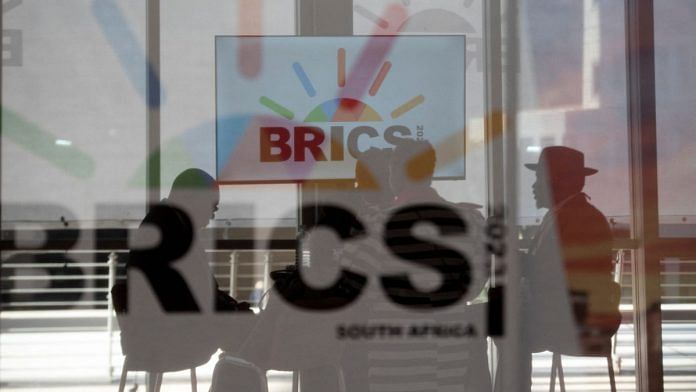New Delhi: In a first, leaders of the BRICS nations urged for an “immediate, sustained and durable humanitarian truce” in Gaza Tuesday, over a month after the Israel-Hamas war began. More than 13,000 Palestinians and 1,200 Israelis have reportedly died in the conflict. India was one of the only BRICS countries that had previously not called for a ‘ceasefire’ in Gaza and rather urged for ‘de-escalation and observing humanitarian law’, and even abstained from voting on the United Nations General Assembly (UNGA) resolution calling for a ‘truce’.
In the Chair’s summary released, leaders of the BRICS nations — Brazil, Russia, India, China and South Africa — along with invited countries noted, “We reiterated our strong support for regional and international efforts aimed at achieving an immediate cessation of hostilities, ensuring the protection of civilians and the provision of humanitarian aid.”
Hosted by South Africa, the chair, in virtual mode, the BRICS’s “Extraordinary Joint Meeting on the Middle East situation” was attended by Russian President Vladimir Putin, Chinese President Xi Jinping, Brazilian President Luiz Inácio Lula da Silva and South African President Cyril Ramaphosa.
United Nations Secretary- General António Guterres and the leaders of Saudi Arabia, Egypt, Ethiopia, Iran and the United Arab Emirates (UAE) were also in attendance. These countries were invited to join the grouping in August this year. BRICS countries represent 40 percent of the world population and a quarter of the global economy.
The statement emphasised on “the importance of preventing further destabilisation and escalation of violence” in the region, calling for all parties to “exercise maximum restraint”. The grouping also reiterated their commitment towards peaceful resolution through dialogue and diplomacy and the two-state solution.
However, Prime Minister Narendra Modi skipped the virtual BRICS-Plus joint meeting and was instead represented by External Affairs Minister S. Jaishankar. Sources in the central government maintained that Prime Minister Narendra Modi could not join the virtual meeting since he was on the campaign trail.
On the 7 October attacks, Jaishankar stated, “Where terrorism is concerned none of us should or can compromise with it. Hostage taking is equally unacceptable and cannot be condoned.”
The BRICS leaders also condemned the “acts of violence aimed at Palestinian and Israeli civilians” as well as the “individual or mass forcible transfer and deportation of Palestinians from their own land”. They also affirmed their support for the UNSC resolution adopted last week calling for “urgent and extended humanitarian pauses and corridors” in Gaza for “a sufficient number of days” to allow full, rapid, safe and unhindered access for UN agencies and partners.
They also called for “the immediate and unconditional release of all civilians who are being illegally held captive,” but did not mention the over 200 hostages taken by Hamas during the 7 October attacks in Israel.
While the US, Germany, Israel, the European Union (EU), among others, have declared Hamas a terrorist group, BRICS nations have yet to designate Hamas as a terrorist organisation.
‘Israel’s actions in violation of international law’
The BRICS Chair’s summary did not highlight the subtle difference in national views of the numerous member countries. While South Africa and China, among others, used strong language to criticise Israel, India’s stance continued to focus on de-escalation and need for restraint without naming either Israel or Hamas.
In his opening remarks as chair of BRICS, Ramaphosa urged for an “immediate ceasefire” and called Israel’s “collective punishment of Palestinian civilians” a war crime.
“The actions by Israel are in clear violation of international law, including the UN Charter and the Geneva Convention read together with its protocols,” Ramaphosa said, adding that by taking hostages, Hamas also violated international law.
“The collective punishment of Palestinian civilians through the unlawful use of force by Israel is a war crime. The deliberate denial of medicine, fuel, food and water to the residents of Gaza is tantamount to genocide,” he added, accusing Israel’s ‘illegal occupation of Palestinian territory’ as the main cause of this conflict.
Xi echoed his South African counterpart’s remarks, calling for “an international peace conference that is more authoritative to build international consensus for peace and work toward an early solution to the question of Palestine that is comprehensive, just and sustainable.”
“There can be no sustainable peace and security in the Middle East without a just solution to the question of Palestine,” he added.
Jaishankar also stated, “Our endeavour should be to both make a difference on the ground immediate while also creating the conditions for lasting solutions.”
Brazil’s Lula, too, observed that the “barbaric acts (of 7 October) do not justify the use of indiscriminate and disproportionate force against civilians.”
However, Putin used this forum to take a dig at the US, observing that the violence in the Middle East is a “consequence of United States’ aspiration to monopolise the mediation role in the Palestinian-Israeli settlement process”.
He also noted, “BRICS states and countries of the region could play a key role in this work finding a political solution to conflict”.
On the other hand, Iranian President Ebrahim Raisi urged BRICS leaders to declare Israel and the Israel Defense Forces as a ‘terrorist regime’ for their crimes in Gaza.
(Edited by Zinnia Ray Chaudhuri)



